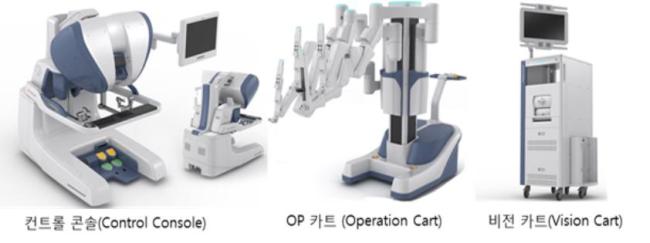South Korea has approved its first locally developed surgical robot, marking a step forward for Korea’s medical robotics technology and its ecosystem.
The Ministry of Food and Drug Safety on Thursday approved Revo-i, a surgical robot system designed to carry out endoscopic surgical procedures including cholecystectomy and prostatectomy. It was developed by local tech firm Meere Company.
In an operating room, the device, equipped with four robotic arms, is positioned directly over a patient. The arms are controlled by a computer that replicates the movements of a surgeon, who sits at a console with a monitor that provides a 3-D view of the surgical site.
 |
Revo-i (Ministry of Food and Drug Safety) |
Robot-assisted surgeries offer better visualization, dexterity, precision and stability for surgeons, enabling them to carry out more intricate surgical procedures with minimal invasion to a patient’s body.
Revo-i is the second surgical robot to be approved by any health regulator in the world for use in minimally invasive endoscopic surgery, following the US-based Intuitive Surgical’s “da Vinci” surgical robot, which was approved by the US Food and Drug Administration in 2000.
As it hits the domestic market, Revo-i is geared to directly compete with da Vinci in the endoscopic surgical equipment market, breaking the market monopoly long held by the latter here.
The new competition is expected to lower the prices of the devices and in turn make robot-assisted surgeries more affordable and accessible to patients in Korea.
While it currently costs around 3 billion won ($2.67 million) to deploy the da Vinci surgical robot system, the medical community expects Revo-I will be available at around 70 percent the price of da Vinci.
“As the newly introduced Korea-made surgical robotics systems replace their more expensive foreign counterparts, patients in need of such surgeries will benefit from major cuts in surgical costs and a faster rehabilitation period,” the Drug Ministry said in a statement.
Korea officially began robot-assisted surgeries in 2005, when Yonsei University’s Severance Hospital performed its first robotic surgery using the da Vinci system. The country has since emerged as an international hub for those who want to receive robotic surgery and those who want to learn it.
Despite its large talent pool of robotic surgeons, Korea did not have a robotic surgery system of its own until now. In 2007, Meere Co. began developing its own device in partnership with robotic surgery experts including those from Severance Hospital. After 10 years of development, it has finally arrived in the market.
Looking ahead, the robotic surgery market is geared for continued growth. According to the Drug Ministry, the global surgical robot market is expected to reach 9.64 trillion won by 2012 at a compound annual growth rate of 12.1 percent.
By Sohn Ji-young (
jys@heraldcorp.com)





![[Exclusive] Hyundai Mobis eyes closer ties with BYD](http://res.heraldm.com/phpwas/restmb_idxmake.php?idx=644&simg=/content/image/2024/11/25/20241125050044_0.jpg)
![[Herald Review] 'Gangnam B-Side' combines social realism with masterful suspense, performance](http://res.heraldm.com/phpwas/restmb_idxmake.php?idx=644&simg=/content/image/2024/11/25/20241125050072_0.jpg)

